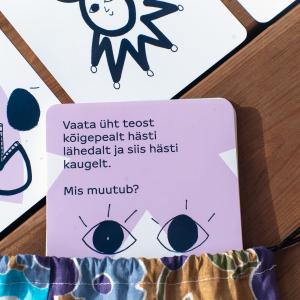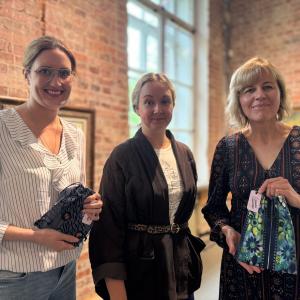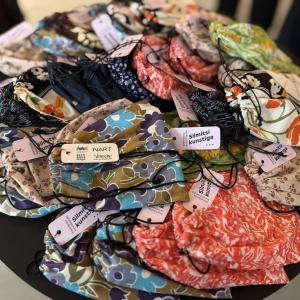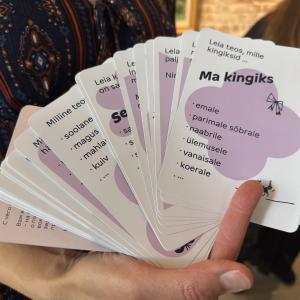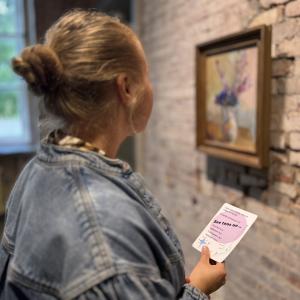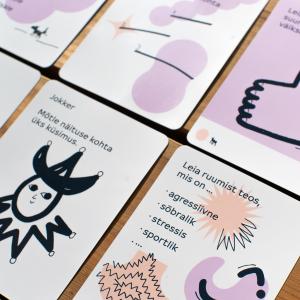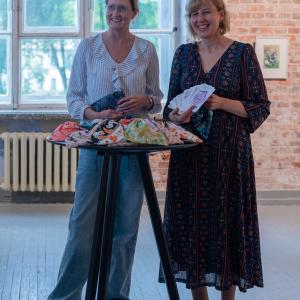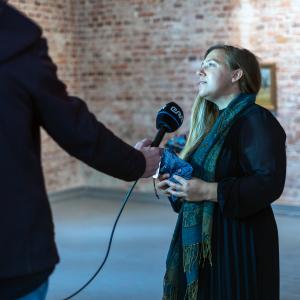The Estonian Language House of the Integration Foundation, Narva Art Residency, and art historian Maarin Ektermann collaborated to produce Face to Face with Art, a new set of art cards. It is a game-based learning tool that allows the player to experience art while practising Estonian in a creative and inspiring way.
The art cards were presented at the Narva Art Residency NART on 18 September. People present at the event had the opportunity to meet the authors and creators as well as try their hand at playing with the cards. Attendees were also gifted the new cards. Anyone who wishes to do so will be able to borrow the decks of cards from art museums and galleries in Tallinn and Tartu starting in October.
Anna Farafonova, Head of the Estonian Language House, said: ‘It is important for the Estonian Language House to create resources for learners that bring joy and broaden their horizons. Face to Face with Art cards combine learning the language with experiencing art – they provide an opportunity to learn Estonian in an experiential and creative way, to experience art, and to discover oneself in a new language environment.’ According to Pille Maffucci, a teacher at the Estonian Language House, people experience similar emotions when entering a classroom or an art gallery, especially a modern art exhibition – they need to overcome a certain barrier, fear of the unknown and the incomprehensible, as well as the fear of looking foolish because they do not understand what is going on. ‘The new set of art cards helps to overcome this fear both when encountering art and when learning a language. When solving tasks, fear disappears. The tasks reinforce what has already been learned or it makes something completely new more familiar,’ said Maffucci.
The aim of the Face to Face with Art cards is to offer language learners and art enthusiasts an exciting and engaging opportunity to experience art, analyse it, while practising Estonian at a level that suits them. The deck contains 42 cards with questions and tasks that help the players delve deeper into works of art and develop their vocabulary, speaking skills, and grammar. The questions are divided into three language levels (A1–A2, B1, and B2). In addition, the deck contains joker cards that allow the players to come up with their own tasks.
The cards can be used alone or in a group, with a teacher, or with friends. Starting from the end of September, the cards will be available at art museums and galleries in Narva and Tallinn.
According to Johanna Rannula, the Head of the Narva Art Residency, the idea of creating a deck of cards began to take shape a few years ago. ‘Maarin Ektermann was visiting Narva and floated the idea. It was as good as done at that moment! Yesterday, teachers in Narva received their decks of cards, and next, we are heading to the capital. We are planning an event in Tallinn in October – the exact time and place will be announced soon. The first batch of cards will soon be sold out, at which point we will consider reprinting them,’ said Rannula.
The art cards were created under the leadership of Pille Maffucci and Sandra Vellevoog from the Estonian Language House of the Integration Foundation, Johanna Rannula from the Narva Art Residency, and art historian and lecturer Maarin Ektermann. The design and illustrations were created by Moonika Maidre, and the pouches were sewn from Kreenholm fabrics by Natalja Kapajeva. Made Isak was responsible for language editing. The cards were printed by Folger Printing House.
The project was inspired by the ‘Kunstiavaja kaardid’ deck of cards (2021) of the Art Museum of Estonia.
The publication of the art cards was sponsored by the Integration Foundation and the Estonian Cultural Endowment.

